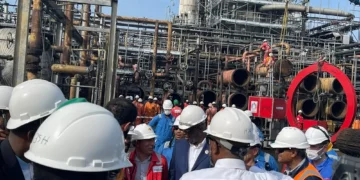The Minister of Power, Adebayo Adelabu, has said the effective management of energy data would help the country attain its pursuit of reliable, accessible, and sustainable energy.
Adelabu who stated this at the commissioning of the Energy Management System Control at Rural Electrification Agency (REA) headquarters in Abuja, yesterday, said energy poverty was a huge challenge in Nigeria and across African countries.
With over 90 million Nigerians said to be un-served by the national grid, the government expressed optimism that the continuing deployment of mini-grids across the country would improve access to electricity.
The control centre which was built by the South Korean government would deliver real-time data that enable the REA to monitor electricity production and consumption across the mini-grids set up in the country.
Adelabu who was represented by the director of Renewable and Rural Access, Aliyu Dapshiman, noted that optimisation of innovation and access to qualitative energy data remain two key pillars in the business of powering a nation.
According to him, “Nigeria, like many nations, is traversing a path toward a more sustainable and resilient energy future. The EMS we unveil today is not merely a technological innovation; it is a testament to our collective dedication to progress, efficiency, and the empowerment of our people.
“For us, the EMS is not just a tool; it is a mechanism we plan to optimise to alleviate the existential problem of poor energy data in the nation’s energy space. It is surely a gateway to a future where data becomes a strategic asset in our pursuit of reliable, accessible, and sustainable energy. This system will revolutionise the way we manage and utilise energy data across our electrification programs”.
The minister also charged the REA with initiating the foundation for the development of the Rural Electrification Strategy and Implementation Plans.
The plan is expected to bring information concerning the expansion of the national grid to rural areas, the development of off-grid power sources, renewable energy power generation, and the impact of ongoing rural electrification projects on economic inequalities in rural and peri-urban areas.
It shall also show the impact of rural electrification on the general rural economy and address gender inequalities in the rural areas in particular and the extent to which the projects set out in the strategic plan are being achieved.
He said: “We hope that the REA will leverage the tool to set the foundation for the development of the Rural Electrification Strategy and Implementation Plans which shall highlight information relating to: the expansion of the national grid to rural areas, the development of off-grid power sources renewable energy power generation the impact of ongoing rural electrification projects on economic inequalities in the rural and peri-urban areas impact of rural electrification on the general rural economy and addressing gender inequalities in the rural areas in particular and the extent to which the projects set out in the strategic plan are being achieved.”
Earlier, the managing director/CEO, REA, Engr. Ahmad Salihijo explained that the agency was working with the Korean government under the Official Development Assistance, ODA, to develop four mini-grids in the Federal Capital Territory.
“Upon full delivery of the ODA project, this intervention would have delivered a total renewable energy capacity of 1.6 MWp and 3.0 MWhr systems across four main communities in the FCT. The most significant part of this intervention is the fact that it further strengthens the agency’s ongoing efforts on productive use through the auxiliary productive use equipment support on appliances including smart metering devices, energy-efficient lighting, grain mills, drying, and water systems, lighting and smart metering devices”, he stated.
While pointing out that the EMS “is not merely a technological marvel”, he noted that “it is a testament to the power of international cooperation and the collective pursuit of a brighter, more energy-empowered future.
“This system represents a significant leap forward in our ability to capture and manage energy data across diverse electrification programs within our nation and through the guidance of the Federal Ministry of Power; we are delighted that the REA is, once again, positioned to implement a project of this magnitude.
“In a landscape where data is paramount, the EMS stands as a beacon of efficiency and transparency. It is a tool that will empower us to make informed decisions, optimise our energy resources, and enhance the impact of our electrification initiatives across Nigeria”.
In his remark, the Korean Ambassador to Nigeria, Kim Young-Chae disclosed that the South Korean government was spending about $12 million to support the deployment of the four mini-grids in the FCT.
He said the government would continue to support Nigeria in its effort to provide electricity to unserved Nigerians, especially those in rural communities.





